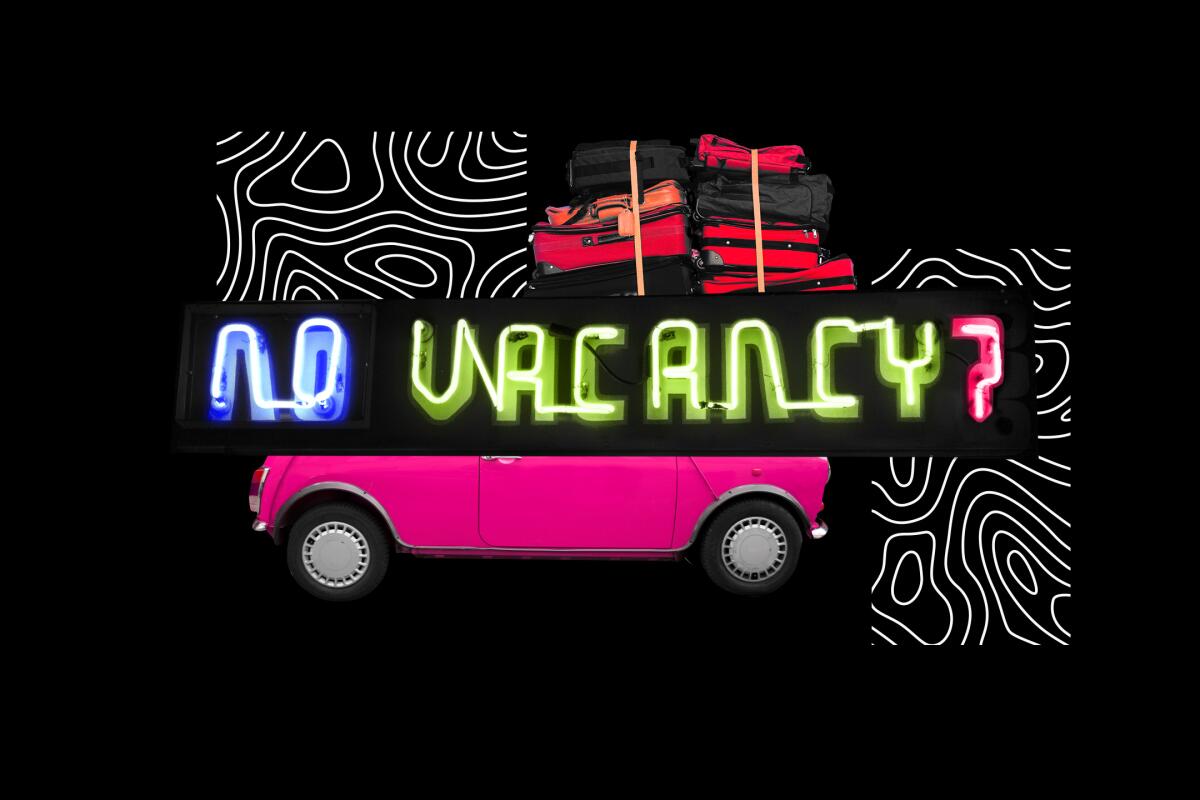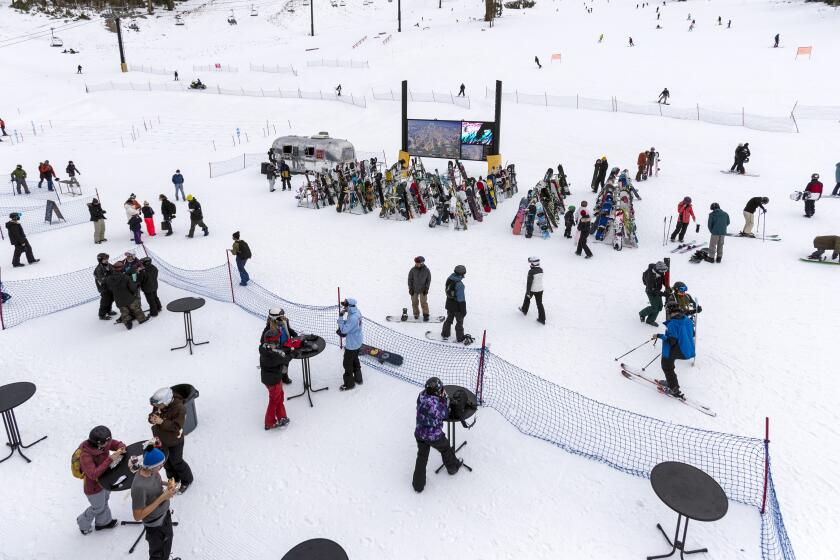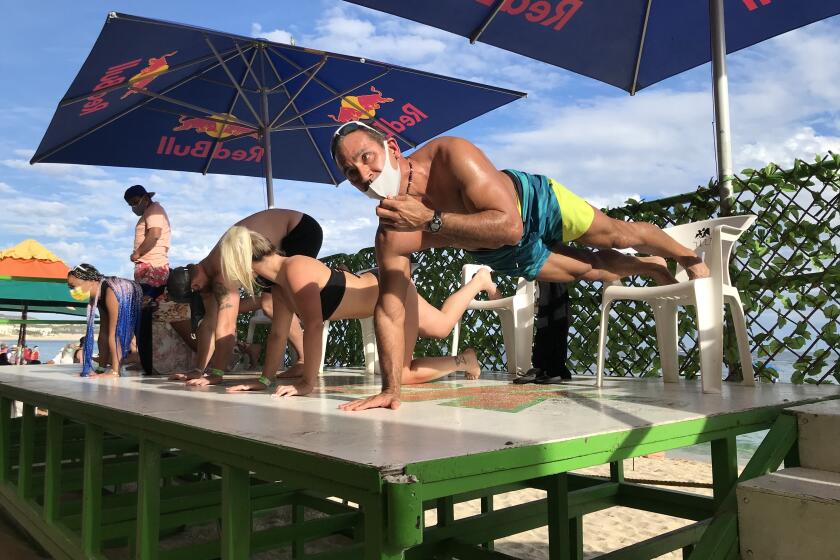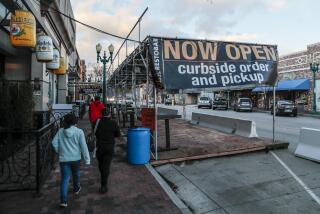Most of California bans vacation stays, but travelers, lodgings aren’t in line

- Share via
Confused about whether it’s OK to stay in a hotel or vacation rental under California’s stricter stay-home rules? You aren’t alone.
Our unscientific survey of more than 50 hotels, motels and other lodgings showed widely mixed results, with the order garnering stronger allegiance in Northern California, weaker in Southern California.
The governor’s Dec. 3 order said lodgings in high-COVID areas of the state are open only to “essential workers” or people who must quarantine, not to vacationers. Still, many lodgings are leaving travelers to make their own decisions. And many travelers continue to scratch their heads or look for loopholes.
At Mammoth and elsewhere, overnight visitors are banned and confusion persists.
“Right now it’s very much the honor system,” California Hotel & Lodging Assn. spokesman Peter Hillan said of the order, which will last at least until Dec. 27 in Southern California and the San Joaquin Valley and several days longer in other areas.
“We have work to do,” Gov. Gavin Newsom told Californians on Tuesday, turning from a discussion of new vaccine shipments to emphasize the role of personal responsibility in fighting the spread of the coronavirus.
The hotel association’s website, noting a guests’ legal right to privacy, tells hoteliers and innkeepers, “There is no requirement for a hotel to request any proof/documentation from an essential worker nor is there any single type of travel authorization for essential workers.”
The association suggests that hoteliers alert potential guests to the new rules on their websites and explain the rules again before guests arrive, and perhaps again when they check in.
What happens when guests contact hotels and short-term rentals? Are lodgings turning away tourists?
To find out, we called, emailed and reviewed websites of more than 50 hotels and short-term rentals in areas from San Diego north to Lake Tahoe where the leisure travel ban is in place.
We described ourselves as “tourists,” “leisure travelers” or “nonessential travelers” seeking lodging between Dec. 18 and 26. (We did not identify ourselves as reporters, so we have not identified any of the lodgings that seemed to defy or be unaware of the governor’s order.)
The state Public Health Department said “essential” reasons for travel include “work and study, critical infrastructure support, economic services and supply chains, health, immediate medical care, and safety and security.”
The same agency said “nonessential” travel includes people on trips that are “considered tourism or recreational in nature.”
Get The Wild newsletter.
The essential weekly guide to enjoying the outdoors in Southern California. Insider tips on the best of our beaches, trails, parks, deserts, forests and mountains.
You may occasionally receive promotional content from the Los Angeles Times.
Among hotels we contacted, many have updated their websites to link to the governor’s order and allow travelers to decide which category they belong to.
• In the L.A. area and Ojai, six of the seven hotels we called acknowledged the rules but are leaving it up to travelers to decide whether they are entitled to book a room. “We’re open for essential travelers; we don’t define what that means for you,” said one customer service operator. “That’s for you to define.” Only one, the Langham, Huntington, Pasadena, discouraged booking because of the rules.
• In San Diego, four of five Airbnb hosts said yes on Dec. 11 to a Christmas-week tourist visit, even though that violates the state order. The fifth host said he was closed for maintenance. (Airbnb’s format invites visitors to “review COVID-19 travel restrictions before you book” but doesn’t address California’s severely limited lodging situation.)
• In Santa Barbara, three of five hotels on Dec. 14 were ready to book a guest despite the guest’s status as a leisure traveler. Of the two that didn’t accept bookings, one was temporarily closed (the Four Seasons Resort the Biltmore Santa Barbara ) and the other said, “We are no longer accepting reservations for that week.”
• In Palm Springs, four hotels said they would allow a reservation to be made; one requires guests to sign a document saying they are essential workers. The Ace Hotel & Swim Club has “temporarily suspended” operations because of the state’s stay-home order, according to its website. The city of Palm Springs initially said hotels could remain open to in-state visitors, but Monday clarified in an email that “short-term lodging is available to in-state travelers only if those travelers are traveling on essential business or for COVID-mitigation purposes.”
• At Mammoth, Airbnb schedules on Dec. 11 showed that 18 of 20 Mammoth hosts were unavailable Dec. 20-27. That could mean they were complying with the state order by rejecting bookings or that they already had guests for those high-demand nights.
• In San Francisco, just one of five calls to hotels on Dec. 14 led to a booking. Two hotels were temporarily closed because of the pandemic. Another, the Fairmont, warned away nonessential travelers with a notice on its website. And at one hotel, the Phoenix Motel on Eddy Street, the reservation agent cautioned a caller, “Unfortunately it’s for essential travel only.”
Welcome to our comprehensive gift guide for the 2020 holiday season.
• In the Lake Tahoe area, six of six hotels said no to nonessential guests or no to all reservations. At the Landing Lake Tahoe Resort and the Basecamp Hotel, both in South Lake Tahoe, reservation agents politely turned away calls seeking a leisure stay.
Farther north, the Ritz-Carlton Lake Tahoe in Truckee, Calif., said only visitors who meet “essential traveler” criteria could book a room. Cedar Glen Lodge in Tahoe Vista and the Springhill Suites by Marriott in Truckee said they would not accept reservations until January at the earliest to comply with the order. Lodging at the Village at Squaw Valley said the same on its website.
Jim Winterberger, president and owner of the rental management company Tahoe Getaways, put this warning on his company website: “We are taking this seriously! Guests found to be making blatant misrepresentations are putting us at great risk, and will be handled accordingly.”
State Public Health Department officials referred questions about enforcement to the Governor’s Office of Emergency Services, which did not immediately respond. The L. A. County Public Health Department said it has done telebriefings for the lodging industry but has not issued citations to hotels or short-term rentals since introduction of the state order.
Among the emailed answers we received from Airbnb hosts:
• “There are loads of tourist visitors, travelers and nonessential visitors from all over in San Diego and Pacific Beach right now. As long as everyone stays careful, sanitizes, wears masks and takes social distancing seriously it’s all good...”
• “Yes ... we are ok to have guests that aren’t essential travelers :)).. [I] hadn’t heard anything about not being able to travel within the state.... I have people coming from other states. Lol!”
Among the hotel reservation agents’ remarks:
• In Santa Barbara: “We’ve been saying yes but there’s always a risk of somebody coming over here and asking if you’re essential.”
• In Los Angeles: “Everybody is still asking the same question but we’re still taking reservations.”
The California Regional Stay Home Order, signed Dec. 3 and supplemented Dec. 6, orders three weeks of tightened restrictions in any region where hospital ICU capacity dips below 15%. One of those restrictions requires hotels and short-term rental hosts to turn away arriving leisure-travel guests, no matter when their reservations were made.
By Dec. 10, the 36 counties of Southern California (including the Eastern Sierra), the San Joaquin Valley and Greater Sacramento (including Lake Tahoe) were all covered by the order. In the 11 counties of the Bay Area, which dipped below 15% ICU capacity on Wednesday, the order takes effect at 11:59 p.m. Thursday, to last at least 21 days. (Several Bay Area counties had already decided to voluntarily join the order. Sonoma County’s restrictions are in place through at least Jan. 9; Monterey County’s, through at least Jan. 11.)
Tourism is quickly recovering in Mexico, as Americans flock south for an easy escape. But it’s also bringing an uptick in COVID-19 cases.
That leaves only northernmost California free of the order’s leisure lodging ban. Under the order, the vast majority of the state’s hotels, motels and short-term rentals should now turn away all tourists from within California.
Moreover, a Nov. 13 state travel advisory urges (but not require) out-of-state leisure travelers not to use hotels or short-term rentals anywhere in California unless they stay and isolate themselves for 14 days.
Cancellation and refund practices vary widely, especially among short-term rentals. But many hotels have loosened their policies during the pandemic. This article gives consumers a view of some options.
Hillan, of the hotel association, said he was unaware of any major outbreaks in California hotels or any lodging cited under the new ban. He said he’d like to see more enforcement by county or state officials, with even-handed scrutiny of hotels and short-term rentals.
“If you want to really stop this, you’ve got to be ubiquitous about regulating where people stay,” Hillan said.
Though state officials have pleaded with Californians for months to stay home as much as possible, many have continued to travel. For the week ending Dec. 5 — just as the stiffer rules were kicking in for Southern California — hotel occupancy statewide was 41.1%, according to surveys on behalf of the marketing organization Visit California. That’s a 38.1% decrease from the same time a year ago.
More to Read
Sign up for The Wild
We’ll help you find the best places to hike, bike and run, as well as the perfect silent spots for meditation and yoga.
You may occasionally receive promotional content from the Los Angeles Times.










